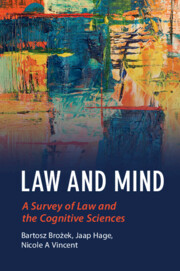Book contents
- Law and Mind
- Law and the Cognitive Sciences
- Law and Mind
- Copyright page
- Contents
- Figures
- Contributors
- Acknowledgements
- 1 Introduction
- I Metatheory and Methodology
- 2 Are the Cognitive Sciences Relevant for Law?
- 3 Social and Normative Facts
- 4 Law, Folk Psychology and Cognitive Science
- 5 Law and the Cognitive Science of Ordinary Concepts
- II Ontology and Epistemology
- III Legal Doctrine and Cognitive Sciences
- IV Evidence
- V Dissenting Opinions
- References
3 - Social and Normative Facts
from I - Metatheory and Methodology
Published online by Cambridge University Press: 21 April 2021
- Law and Mind
- Law and the Cognitive Sciences
- Law and Mind
- Copyright page
- Contents
- Figures
- Contributors
- Acknowledgements
- 1 Introduction
- I Metatheory and Methodology
- 2 Are the Cognitive Sciences Relevant for Law?
- 3 Social and Normative Facts
- 4 Law, Folk Psychology and Cognitive Science
- 5 Law and the Cognitive Science of Ordinary Concepts
- II Ontology and Epistemology
- III Legal Doctrine and Cognitive Sciences
- IV Evidence
- V Dissenting Opinions
- References
Summary
To talk of ‘ought-facts’ is apt insofar as any manifestation of an Ought seems to be connected with some kind of objectivity. And if facts are simply ‘true thoughts’, there is nothing strange about saying, for example, ‘It is a fact that, under circumstances c, x ought to be the case’. Taking ought-facts to be facts sui generis does not entail, however, that they can be reduced to natural facts, or brute social facts (or some other kind of non-normative facts). On the contrary, the case might be argued that natural facts depend for their objectivity on irreducible normativity, namely, obligations to think in a certain way.
- Type
- Chapter
- Information
- Law and MindA Survey of Law and the Cognitive Sciences, pp. 50 - 54Publisher: Cambridge University PressPrint publication year: 2021



